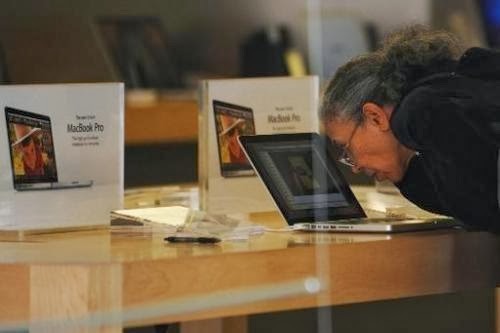Mark Anthony Neal's Blog, page 845
January 16, 2014
Dule Hill Returns to Broadway in 'After Midnight' with Fantasia
Published on January 16, 2014 11:51
2014 Hiphop Literacies: A Working Conference--Ohio State University, Feb 3-4

The conference is scheduled to be held on February 3rd and 4th, 2014
Registration is Now Open. Register for the conference.
Registration open until January 22nd or until full. Please register for the event. Must register in advance. Space is LIMITED!Advance General Public-$5.00
Onsite registration, if space is available-$10.00$5.00 FEE Guarantees your space as well as meals as indicated for both days!!Ohio State students free with BuckID (must have Ohio State email address).
All events take place at the Frank Hale Black Cultural Center, 154 W. 12th, Ave., unless noted otherwise.Monday February 3rd9:30am - 11:45amDr. Christopher Emdin - Science for the Hiphop GenerationA sample of Dropping Science!

Dr. Christopher EmdinChristopher Emdin is an Associate Professor in the Department of Mathematics, Science and Technology at Teachers College, Columbia University; where he also serves as Director of Science Education at the Center for Health Equity and Urban Science Education. He is currently a Caperton Fellow and Hip-Hop Archive Fellow at the WEB DuBois Institute at Harvard University.Dr. Emdin is a social critic, public intellectual and science advocate whose commentary on issues of race, culture, inequality and education have appeared in dozens of influential periodicals including the New York Times, Wall Street Journal, and Washington Post.Dr. Emdin holds a PhD in Urban Education with a concentration in Mathematics, Science, and Technology; Masters degrees in both Natural Sciences and Education Administration, and Bachelors degrees in Physical Anthropology, Biology, and Chemistry.He is the co creator of the #HipHopEd social media movement, and a much sought-after public speaker on a number of topics that include hip-hop education, STEM education, politics, race, class, diversity, and youth empowerment. He is also an advisor to numerous international organizations, school districts, and schools where he delivers speeches, and holds workshops/ professional development sessions for students, teachers, policy makers, and other education stakeholders within the public and private sector.Dr. Emdin writes the provocative “Emdin 5” series on a number of contemporary social issues for the Huffington Post. He is also author of the award winning book, Urban Science Education for the Hip-hop Generation.Dr. Tanya Saunders, Queering Hiphop Studies
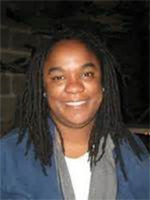
Dr. Tanya L. SaundersBIOGRAPHY Dr. Tanya L. Saunders is an Assistant Professor in the Department of African American and African Studies. As a sociologist/Latin American Studies scholar, Tanya’s academic interests lie in the areas of Coloniality Studies/Postcolonial theory, Cultural Studies/Sociology of Culture, Afro-Latino Studies, arts-based social movements, race, gender, sexuality and critical queer theory. She has a forthcoming book on the Cuban Underground Hip Hop Movement, tentatively entitled Black Thoughts, Black Revolution: Cuban Underground Hip Hop and Black Modernity.Tanya is interested in the ways in which the African Diaspora, throughout the Americas -especially Afro-descendent gender and sexual minorities, have used the arts as a tool for social change. She has published in journals such as Latin American Perspectives, The Caribbean Review of Gender and Studies, Black Women, Gender and the Family, Feminist Media Studies, Souls: A Critical Journal of Black Politics, Culture and Society. She has several forthcoming articles and book chapters, the most recent is a 2013 Chapter in the anthology Black Gender and Sexualities. She is currently completing an anthology on the Cuban Underground Hip Hop Movement entitled: Underground Cuban Hip Hop: A Handbook. Recently, she was the 2011-2012 Fulbright scholar to Brazil where she began work on her next project, which compares São Paulo Hip Hop and Rio de Janeiro’s Baile Funky scenes.12:00pm - 1:15pm (Lunch Presentation)Theo Ressa, PhD Candidate, The Ohio State University - Krip Hop: HipHop & Disability

Theo RessaBIOGRAPHY Theo Ressa is a winner of 2007 Ford Foundation Scholarship. He has a bachelor’s degree in Special Education, English and Literature, and master’s degree in special education. He is currently a doctoral candidate in Multicultural and Equity Studies and Global Education program. He would describe himself as coming from disability studies, multicultural and equity studies, inclusive education, and special education background and ideology. He actively participates at forums, workshops, focus groups, classes, and conferences to disseminate information about disability. These experiences have exposed him to a wide range of possible debates on persons with disabilities, which to a certain extent affects his interpretation of events and discussions. Of recent, his focus has shifted to inclusive education. As scholar of inclusive education, Theo incorporates various teaching strategies such as Krip Hop to consciously raise general education student teachers awareness of inclusive practices and Universal Design of Learning principles. Beyond classroom, Theo uses Krip Hop as a tool for advancing social justice.1:30pm - 3:45pmJaqueline Lima Santos and Lu Afrobreak of the Afrobreak Crew-A View from the Diaspora: Brazil

Jaqueline Lima SantosBIOGRAPHY Jaqueline Lima Santos earned a BA in Social Sciences by the Pontifícia Universidade Católica (PUC) of Campinas and Master’s Degree of Social Science in Anthropology at Universidade Estadual Paulista (UNESP). Her subjects of interest and research are hip-hop culture, the Black movement, Black women, and identity and memory in the African diaspora.She is a member of the Black People Center for Research and Extension (NUPE) and the Anthropological Focus Group.She was awarded the Kabengele Munanga prize for best scientific work by the Africa Forum in 2007, with her research: “The Meaning of Blackness in Hip Hop: From Maroons to Periphery”, and second classification in article contest for “The Fight against Racism for Women in Latin America and the Caribbean” with the essay “Lelia Gonzalez: Black Women and Intellectual” in 2010.WORKSHOP DESCRIPTION This workshop will bring a Brazilian perspective on Hiphop pedagogies. Hiphop has emerged as a Global culture manifesting diverse local scenes around the world. The absorption of Hiphop into Brazilian culture provides an opportunity to examine one of the particular ways in which Hiphop organizations have emerged as an instrument of schooling and literacies. This workshop provides a theoretical framework on Brazilian Hiphop and its significance in the Education of Blacks in Brazil. We will share how Hiphop changes lives and contributes to new perspectives to education and social projects.Specific examples of this process center on the activism of Brazilian Hiphoppers in places called “Casa do Hiphop”, (in English) “Hiphop House.” We have many Hiphop houses in Brazil, but we will focus on Hiphop houses located in São Paulo state: Diadema, São José do Rio Preto and Campinas. Materials, such as videos, fanzines, magazines, CDs will give participants of this workshop a taste of the Brazilian Hiphop experience.Dr. Bettina Love Hiphop in Elementary and Secondary Education

Dr. Bettina L. LoveBIOGRAPHY Bettina L. Love is an Assistant Professor in the Department of Educational Theory & Practice at the University of Georgia. Her research focuses on the ways in which urban youth negotiate Hip Hop music and culture to form social, cultural, and political identities. A continuing thread of her scholarship involves exploring new ways of thinking about urban education and culturally relevant pedagogical approaches for urban learners. More specifically, she is interested in transforming urban classrooms through the use of non-traditional educational curricula (e.g., Hip Hop pedagogy, media literacy, Hip Hop feminism, and popular culture). Building on that theme, Dr. Love also has a passion for studying the school experiences of queer youth, along with race and equality in education. She is the author of Hip Hop’s Li’l Sistas Speak: Negotiating Hip Hop Identities and Politics in the New South (2013 Critics Choice Award, American Educational Studies Association). Her work has appeared in numerous books and journals, including the International Journal of Critical Pedagogy, Journal of LGBT Youth, Urban Review, Educational Studies, and Race, Gender and Class.WORKSHOP DESCRIPTION As Hip Hop-based education (HHBE) becomes an ever more popular pedagogical practice, questions must be raised concerning how HHBE moves beyond beats and rhythms to promote critical thinking, community-building, and principles of social justice. This workshop is designed for elementary and middle school educators aimed at assisting teachers in creating curriculum aligned with the Common Core State Standards focused on social justice, community-building, and critical thinking in context of the elements of Hip Hop (Graffiti, MCing, Deejaying, Breakdancing, and Knowledge of Self and Community). The overall goal of the workshop is to teach educators the history and five pillars of Hip Hop, with special emphasis on the fifth element: Knowledge of Self and Community. Through student interviews, work, and teaching videos, the workshop highlights the educational outcomes of HHBE when linked to the five elements of Hip Hop, formal school curriculum, the sociopolitical lives of urban learners, and multiliteracies.6:30 PMPanel on Hiphop and Civil Rights featuring the legendary Hiphop Activist and Artist, from Public Enemy Mr. Chuck D (Ohio Union/Performance Hall)Tuesday February 4th8:45am - 10:00amNew Directions in Hiphop Studies with Drs. Regina Bradley and John Jennings

Dr. Regina N. BradleyBIOGRAPHY Regina N. Bradley, PhD is an instructor of English and Interdisciplinary Studies at Kennesaw State University. She earned her PhD in African American Literature at Florida State University in 2013. Regina writes about post-Civil Rights African American literature, the contemporary U.S. South, pop culture, race and sound, and Hip Hop. Her current book project explores how hip hop (culture) sensibilities can be used to navigate race and identity politics in this supposedly postracial moment of American history. Regina has two forthcoming articles: “Conceptualizing Hip Hop Sonic Cool Pose in Late 20th and 21st Century Rap Music” in Current Musicology and “Strictly 4 My N.I.G.G.A.Z.?: the Messy Organic Intellectualism of Tupac Shakur” in the Journal of Hip Hop Studies. Also known as Red Clay Scholar, a nod to her Georgia upbringing, Regina maintains a blog and personal website – www.redclayscholar.com. She can also be reached on Twitter: @redclayscholar.
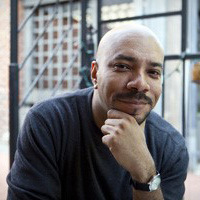
John JenningsBIOGRAPHY John Jennings is Associate Professor in the Department of Visual Studies at University at Buffalo, The State University of New York. His research and teaching focus on the analysis, explication, and disruption of African American stereotypes in popular visual media. His research is concerned with the topics of representation and authenticity, visual culture, visual literacy, social justice, and design pedagogy. Mr. Jennings is an accomplished designer, curator, illustrator, cartoonist, and award-winning graphic novelist. His work overlaps into various disciplines including American Studies, African American Studies, Design History, Media Studies, Sociology, Women and Gender Studies, and Literature.10:15am - 12:15pmDrs. Mark Anthony Neal and Treva Lindsey—Gender and Sexuality
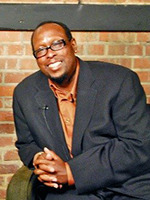
Dr. Mark Anthony NealMark Anthony Neal is Professor of Black Popular Culture in the Department of African and African-American Studies at Duke University, where he won the 2010 Robert B. Cox Award for Teaching. He is the author of five books, What the Music Said: Black Popular Music and Black Public Culture (1998), Soul Babies: Black Popular Culture and the Post-Soul Aesthetic (2002), Songs in the Keys of Black Life: A Rhythm and Blues Nation (2003) and New Black Man: Rethinking Black Masculinity (2005). Neal is also the co-editor (with Murray Forman) of That’s the Joint!: The Hip-Hop Studies Reader, 2nd Edition (2011) Routledge. Neal’s latest book is Looking for Leroy: (Il)Legible Black Masculinities (2013) New York University Press.Neal hosts the weekly webcast, “Left of Black” in collaboration with the John Hope Franklin Center at Duke University (Duke on Demand). A frequent commentator for National Public Radio, Neal is a weekly columnist and contributes to several on-line media outlets, including The Root.com, theGrio.com, SeeingBlack.com and Britain’s New Black Magazine. Neal maintains a blog at NewBlackMan.

Dr. Treva LindseyBIOGRAPHY Assistant Professor of Women’s, Gender and Sexuality Studies at The Ohio State University, Treva Lindsey specializes in black feminist theory, women’s history, and popular culture studies. She has published in and has forthcoming publications in The Journal of Pan-African Studies, SOULS, African and Black Diaspora, the Journal of African American Studies, and African American Review. She is also the recipient of several awards and fellowships from the Woodrow Wilson Foundation, the Social Science Research Council, the Andrew W. Mellon Foundation, Emory University, the National Women’s Studies Association, and the Center for Arts and Humanities at the University of Missouri. Her first book entitled, Colored No More: New Negro Womanhood in the Nation’s Capital is currently under review. She is also the co-editor of a forthcoming collection of essays on black popular culture in the twenty-first century. Her next book project will focus on popular culture representations of contemporary African American womanhood from the late twentieth century to the present. She is building a strong online presence through guest contributing to online forums such as The Feminist Wire and The Left of Black Web Series.WORKSHOP DESCRIPTION This workshop will hone in on how hip hop studies engages gender and sexuality. Exploring the growing body of hip hop-based scholarship and activism pivoting around women and GLBT people, Drs. Neal and Lindsey will offer insights on effective methodologies, theoretical frameworks, and paradigms for examining the complexity hip hop’s gender and sexual politics. Using a seminar format, participants will survey the progressive, transgressive, and regressive possibilities and politics extant in hip hop. Furthermore, the workshop will provide a critical conversation about if and how hip hop shapes, configures, and remixes gender and sexual identities. The workshop will cover topics such as: misogyny, sexism, heteropatriarchy, transphobia, homophobia, genderqueer identity, non-normativity, feminism(s), masculinities, and representational politics. Workshop participants will acquire both teaching and research tools to improve how we teach, study, and discuss hip hop’s gender and sexual politics.Drs. Emery Petchauer and Joycelyn Wilson-New Directions in Hiphop Education

Dr. Emery PetchauerBIOGRAPHY Emery Petchauer is an Assistant Professor of urban education in the Teacher Development and Educational Studies department at Oakland University. His research focuses on the cultural dimensions of teaching and learning in urban schools and universities as well as teacher development, licensure, and policy. He is the author of Hip-Hop Culture in College Students’ Lives: Elements, Embodiment, and Higher Edutainment (Routledge, 2012) and the co-editor of Schooling Hip-Hop: Expanding Hip-Hop Based Education Across the Curriculum (Teachers College Press, 2013). Professor Petchauer’s research has received attention in Diverse Issues in Higher Education, Inside Higher Ed, and the Philadelphia, Boston, and New York Metro papers. A former high school English teacher, he has received teaching awards at both secondary and higher education levels.

Dr. Joycelyn A. WilsonBIOGRAPHY Joycelyn A. Wilson is an assistant professor of educational foundations at Virginia Tech and and affiliate faculty in the Institute for Creativity, Arts, and Technologies (ICAT). She is an ethnographer with interests in hip-hop based education and sociocultural factors influencing urban education in K-12 and post-secondary formal and informal learning environments. Professor Wilson is the founder of the Four Four Beat Project, a digital pedagogies laboratory located on the Virginia Tech campus that focuses on the use of music, technology, and culture to develop the authentic leadership capacities of youth and youth influencers, as well as expose the next generation of innovators to professional opportunities in STEM. Her archive is the first one located at an institute of technology in the American Southeast. Visit atwww.fourfourbeatproject.org and like Four Four Beat Project on Facebook and Instagram.Dr. Wilson is part of the #HipHopEd collective, a regular contributor to The Root, and a Hip Hop Archive Alumnus Fellow at the W.E.B. Du Bois Institute, part of the Hutchins Center of African and African American Research at Harvard University. Along with civil rights icon Andrew Young, she is the co-producer of the Emmy Award-winning documentary “Walking With Guns”, featuring rapper/actor Clifford “TI” Harris, Jr.A product of the Atlanta Public Schools and former high school math teacher, Dr. Wilson received her BS in Mathematics and PhD from the University of Georgia, and MA in education from Pepperdine University. She credits her family, friends, and mentors for her success. Follow her on Twitter @drjoycedotnet and Instagram@styleandscholarship.WORKSHOP DESCRIPTION This interactive workshop will give an overview of the ways that hip-hop is used for educational purposes in and out of schools among youth and young adults. Delving deeper, it will explore the interconnections between hip-hop practices, artifacts, and learning. By practices, we refer to sampling, battling, movement, and others that take place in hip-hop spaces and cyphers. By artifacts, we refer to vinyl records, music, turntables, and others that people use while creating hip-hop. Participants can expect to engage in hands-on and ears-open activities with hip-hop artifacts to understand how these facilitate learning in the culture of hip-hop. Participants can expect to leave the workshop with general guidelines about how to use hip-hop practices and artifacts as a source of learning in other educational settings.1:45pm - 4:00pmDrs. Oneka LaBennett and Carla Stokes, Black Girlhood and Hiphop

Dr. Oneka LaBennettBIOGRAPHY Oneka LaBennett is Associate Professor of Africana Studies at Cornell University. She received her PhD in Social Anthropology from Harvard University in 2002, and her BA in Sociology and Anthropology from Wesleyan University in 1994. Her research and teaching interests include popular youth culture; race, gender and consumption; urban anthropology; transnationalism and diaspora; and Caribbean migration. LaBennett is the author of She’s Mad Real: Popular Culture and West Indian Girls in Brooklyn (New York University Press, 2011), and editor of Racial Formation in the Twenty-First Century (University of California Press, 2012; co-edited with Daniel Martinez HoSang and Laura Pulido). In addition to her contributions to academic journals and edited volumes, LaBennett has published Op-eds in Ms. Magazine and in The Huffington Post. Her Op-ed, “How Does Nicki Minaj Influence Black Girls? Ask Them,” was quoted in the April 2013 issue of Elle Magazine. She has also conducted oral history research on art and culture in the Bronx with a focus on Bronx women’s contributions to hip hop music. LaBennett was born in Guyana and raised in Brooklyn, New York.WORKSHOP DESCRIPTION This workshop will engage participants with ethnographic research on Black adolescent girls in Brooklyn and with historical accounts of young women’s contributions to hip hop culture in New York City. Based in part on the research conducted for She’s Mad Real: Popular Culture and West Indian Girls in Brooklyn (NYU Press 2011), the workshop addresses the following questions: Are Black teenage girls equipped to decipher the contradictory and often times derogatory representations of women and girls in hip hop music? How do girls’ interpretations of and interactions with hip hop differ from those of adults, educators, and academics? How are contemporary female hip hop artists/activists using the genre to empower girls and women? The workshop will situate Black girls not as passive victims but as active consumers who offer meaningful critiques of popular representations of Black femininity. We will explore specific accounts of Brooklyn girls’ understandings of hip hop music and culture. The workshop will prompt participants to critically engage with “old school” and contemporary hip hop songs produced by female artists including Roxanne Shanté and Nicki Minaj.

Dr. Carla StokesBIOGRAPHY Hip hop-influenced popular culture has been criticized for glorifying sex, violence, misogyny, consumerism, substance use, and other risky behaviors. This workshop is designed to assist educators, mentors, adult allies, youth workers, and girl-serving professionals in understanding the role of hip hop-influenced popular culture in the lives of black girls. We will explore creative strategies and best practices for using hip hop as a tool for educating black girls and involving them in health, media literacy, leadership, and youth development programs.WORKSHOP DESCRIPTION Carla Stokes, PhD, MPH is a teen health and behavior expert, girl empowerment advocate, professional speaker, and success coach who specializes in helping young women, girls, and parents thrive through the pressures and transitions of adolescence. Dr. Carla is also the founder of Helping Our Teen Girls In Real Life Situations, Inc. (HOTGIRLS)®, an award-winning 501(c)(3) nonprofit organization dedicated to empowering underserved young women and girls to develop leadership skills, create positive social change in their communities, and realize their full potential.Dr. Carla began using hip hop-influence popular culture as an educational tool in the classroom in the 1990’s, while she was enrolled as a student at Spelman College. She earned her Doctor of Philosophy and Master of Public Health degrees from the University of Michigan and completed a post-doctoral research fellowship at the U.S. Centers for Disease Control and Prevention. During her doctoral studies at the University of Michigan, Dr. Carla taught a course on representations of black women in hip hop and popular culture as an instructor in the Department of Women’s Studies. Her activism and pioneering scholarly research on the intersections between black adolescent girls’ sexuality, identity and body image with youth culture, hip hop, and social media have been published in academic journals and books and featured in national media outlets. For more information about her work, visit www.drcarla.com.4:30pm - 6:30pmMs. Joan Morgan and Dr. Brittney Cooper, From Hiphop Feminism to Hiphop Generation Feminism

Joan MorganBIOGRAPHY Joan Morgan is an award-winning journalist, author and a provocative cultural critic. A pioneering hip-hop journalist, she began her professional writing career freelancing for The Village Voice. Morgan’s passion and commitment to the accurate documentation of hip-hop culture combined with adept cultural criticism placed her at the forefront of music journalism. She was one of the original staff writers at Vibe magazine and a contributing editor and columnist for Spin. Morgan has written for numerous publications among them MS., More, Interview, Working Mother, GIANT, and Essence magazines. In January 2000, she was asked to join the Essence staff where she served as Executive Editor.Morgan coined the term “hip-hop feminism” in 1999, when she published the groundbreaking book, When Chickenheads Come Home to Roost. Her book has been used in college coursework across the country. Fresh, witty and irreverent, it marked the literary debut of one of the most original, perceptive and engaging young social commentators in America today. Frequently reprinted, her work appears in numerous college texts, as well as books on feminism, music and African-American culture.Regarded internationally as an expert on the topics of hip-hop and gender, Morgan has made numerous television and radio appearances—among them MTV, BET, VH-1, Like It Is, and CNN.Morgan has taught at her high school alma mater, the prestigious Fieldston School for five years. She was an instructor in the Creative Writing Program at the New School in New York City and a Visiting Instructor at Duke University where she taught “The History of Hip-Hop Journalism” and a Visiting Research Scholar at Vanderbilt University. In 2013, she was Visiting Instructor at Stanford University’s Institute for the Diversity of the Arts where she was awarded the St. Claire Drake Teaching Award. It is the first time the award has ever been given to a Visiting Scholar.

Dr. Brittney CooperBIOGRAPHY Brittney Cooper is an Assistant Professor of Women’s and Gender Studies and Africana Studies at Rutgers University. A scholar of Black women’s intellectual history, Black feminist thought, and race and gender in popular culture, Dr. Cooper writes extensively about both historic and contemporary iterations of Black feminist theorizing. Dr. Cooper’s first book Race Women: Gender and the Making of a Black Public Intellectual Tradition is under review with a major university press. Dr. Cooper is co-founder along with Dr. Susana Morris of the Crunk Feminist Collective, a feminist of color scholar-activist group that runs a highly successful blog. Three members of the CFC were recently profiled in Essence Magazine’s list of Young, Black, and Amazing women under age 35. Recently named to The Root 100--2013, an annual list of top Black influencers, Dr. Cooper is committed to doing accessible public scholarship that respects people inside and outside of the academy as knowledge producers. She is a regular contributor at Salon.com and her cultural commentary has appeared at Ebony.com, TheRoot.com, the Los Angeles Times, the New York Times, TV Guide, Huffington Post Live, Colorlines.com, NPR, and Al Jazeera America.
Published on January 16, 2014 11:19
AfroPoP Talks 'Doin' It in the Park' with Bobbito Garcia
 NBPC | AfroPoP
NBPC | AfroPoPFilmmakers Bobbito García and Kevin Couliau discuss how their cultural exchange produced this dynamic documentary about the legacy of street basketball and the sports legends it produced from NYC. Be sure to catch " Doin' It in the Park: Pick-Up Basketball NYC " on AfroPoP, Monday January 13th at 8PM ET/10PM PT.
For more information visit http://AfroPoP.tv
Co-presented by Latino Public Broadcasting.
Published on January 16, 2014 08:16
January 15, 2014
Promo: From Selma to Raleigh | 2014 Moral March on Raleigh
 Moral Monday Movement
Moral Monday MovementOn February 8th, 2014, North Carolina will see the largest, most diverse and visionary cross-issue mass mobilization ever in the state. In the tradition of MLK and the historic march from Selma to Montgomery, the 2014 Moral March on Raleigh HKonJ People's Assembly is destined to be historic.
Published on January 15, 2014 18:51
Tell Me More: How To Bridge The Racial Tech Gap
Published on January 15, 2014 17:30
January 14, 2014
Left of Black S4:E15: The Latining of America + Creating Alternative Images of Black Women
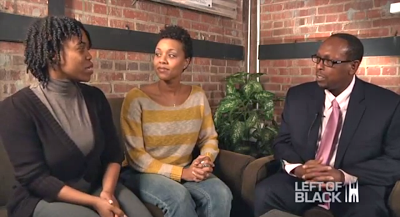
Left of Black S4:E15: The Latining of America + Creating Alternative Images of Black Women
Left of Black host and Duke University Professor Mark Anthony Neal is joined in studio by Duke Professor Claudia Milian, author of Latining America: Black-Brown Passages and the Coloring of Latino/a Studies (University of Georgia Press).
Later, Neal sits down with actress Lakeisha Coffey and writer/director Chaunesti Webb, who discuss Webb's play, I Love My Hair: The Remix , which opens at the ManBites Dog Theater on January 16, 2014.
Left of Black is a weekly Webcast hosted by Mark Anthony Neal and produced in collaboration with the John Hope Franklin Center at Duke University.
***
Episodes of Left of Black are also available for free download in @ iTunes U
***
Follow Left of Black on Twitter: @LeftofBlackFollow Mark Anthony Neal on Twitter: @NewBlackManFollow Claudia Millian on Twitter: @ClaudiaMilian
Follow Chaunesti Webb on Twitter: @Chaunesti
Published on January 14, 2014 09:50
January 13, 2014
Black Masculinity, Genius & the Expressive Arts with Guthrie Ramsey Jr. + Mark Anthony Neal + Greg Tate

Black Masculinity, Genius & the Expressive Arts with Guthrie Ramsey Jr. + Mark Anthony Neal + Greg Tate
Guthrie P. Ramsey, University of Pennsylvania and Mark Anthony Neal, Duke University celebrate their new books The Amazing Bud Powell: Black Genius, JazzHistory and The Challenge of Bebop and Looking for Leroy: Illegible BlackMasculinities. They will be joined in a wide-ranging conversation about Black Masculinity, Genius and the Expressive Arts by eminent cultural critic Greg Tate as part of the exhibitions William H. Johnson: An American Modern at the Arthur Ross Gallery at the University of Pennsylvania and Archibald Motley: Jazz Age Modernist, which opens at the Nasher Museum for Art at Duke University
WILLIAM H. JOHNSON: AN AMERICAN MODERN Thursday, January 20, 20145:30 pm
The Arthur P. Ross Gallery220 South 34th StreetPhiladelphia, PA 19104-6303
Archibald Motley: Jazz Age ModernistThursday, February 20, 20147:00 pm
The Nasher Museum of Art at Duke University2001 Campus DriveDurham, NC 27705
Published on January 13, 2014 20:20
January 12, 2014
35 Years After His Death, Donny Hathaway Still Sings a Song for Us by Mark Anthony Neal
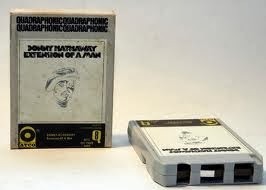 35 Years After His Death, Donny Hathaway Still Sings a Song for Usby Mark Anthony Neal
35 Years After His Death, Donny Hathaway Still Sings a Song for Usby Mark Anthony Neal"This is dedicated to who it may concern"--Donny Hathaway
When singer-songwriter-producer-and-arranger Donny Hathaway fell out of a New York City hotel window in January of 1979, he was an artist simply trying to re-establish himself. Hathaway peaked artistically much earlier in the decade, his voice muted by a debilitating mental illness and a fickle recording industry, that has never really been all that interested in Black artists being so introspective and thoughtful.
Yet the music that Hathaway created—drawing on the uniquely American traditions of Rhythm & Blues, Soul music, Jazz, Gospel, the Blues and even marching bands (all with a classical flair)—continues to resonate 35 years after his death.
As an artist, Hathaway actively looked back to Black musical traditions—you hear references in his music to pianists Fats Waller and James P. Johnson to Count Basie to Mahalia Jackson—while spiritually, he looked inward to the conflicts that were tearing up his very soul. For Hathaway, these were not simply gestures; it was so much more than a strategic sampling of the sonic archive of Blackness.
The score that Hathaway did for Come Back Charleston Blue (1973); for example, evinced Hathaway’s deep affection and affinity for Big Band Jazz. Tracks like “Thank-You Master (for my Soul),” “Giving Up” and his stellar cover of Leon Russell’s “A Song for You” draw deep from dirge-like Blues and Gospel traditions. Tracks like “Voices Inside (Everything is Everything)” and “Valdez in the Country” were as solidly in the pocket as anything being produced by James Brown’s band at the time.
The songs that Hathaway covered also drew far and wide: Nina Simone’s “Young, Gifted and Black,” George Clinton’s obscure “She is My Lady,” Billy Preston’s “Little Girl,” Ray Charles “I Believe to My Soul” and even John Lennon’s “Jealous Guy.” Hathaway offered such a uniquely personal take on the music of others that it is not surprising that some believe, for example, that “A Song for You”—featured in one of Hathaway’s most classic live recordings—was his own composition.
It is telling though, that for much of White America, Donny Hathaway was simply the voice who sang (and composed) the theme to Bea Arthur’s sitcom Maudeand recorded a fairly popular Christmas song. It says a great deal about how Black genius is valued in America that what is arguably Hathaway’s most well known recording and composition—“This Christmas”—is a throw-away in the context of his oeuvre.
Hathaway likely could not dismiss the fact that an artist like Elton John, who was arguably his closet artistic peer in the early 1970s and who, with a close listening of his catalogue, seemed just as familiar with pianists like Waller and Johnson—could achieve a level of fame that Hathaway neither wanted, but also knew, was not available him. With the exception of three singles with Roberta Flack, none of Hathaway’s singles ever cracked the Top-Pop-40. Surprisingly, Hathaway’s highest charting single as a solo artist on the Soul/R&B charts was his cover of J.R. Bailey’s “Love, Love, Love,” which peaked at 16.
Though it’s easy to think of Hathaway in the tradition of the self-contained artist, who often accompanied himself on piano and keyboard, some of his most memorable recordings were the product his need for collaboration. Hathaway’s duets with Flack, notably “Where is the Love?” and “The Closer I Get To You,” were his most commercially successful singles. Not surprisingly it was the possibility of working with Flack that brought Hathaway back to the studio shortly before his death—the duo recorded three tracks including, the Stevie Wonder penned “You are My Heaven,” that eventually appeared on Roberta Flack featuring Donny Hathaway (1980). Luther Vandross provided backing vocals on the project.
Frankly, there’s an argument to be made that had Hathaway survived the decade of the 1970s, that future would not have been kind to him. Hathaway’s musical sensibilities were not necessarily built for commercial success in the 1980s, as what we now call R&B plugged into programmed synthesizer and drum machines, standard bearers of Pop-Soul like Michael Jackson, Whitney Houston, Prince, and Lionel Ritchie became arena artists, and Hip-hop sonically remixed the very landscapes that Hathaway so brilliantly depicted early in his career with tracks like “The Ghetto” and “Little Ghetto Boy” (later sampled by Dr. Dre on The Chronic)
Donny Hathaway’s music demanded an intimacy that neither the recording industry, and quite frankly, segments of Black America, seemed to value. Hathaway found that intimacy collaborating with peers in the studio and on stage, like Ric Powell, Leroy Hutson, Cornell Dupree, Phillip Upchurch, Willie Weeks and most famously Flack; he found that intimacy in the call-and-response with audiences that marked so many of his live performances.
Indeed Hathaway’s label, under the helm of the late Jerry Wexler, intuitively understood Hathaway’s need for that connection. As exemplified by the recent Hathaway collection Never My Love: The Anthology , no Black artist of the era was better documented under live conditions, with the exception of Miles Davis. Hathaway’s live performance of “Young, Gifted and Black,” originally released on In Performance (1980), is a testament to the energy Hathaway drew from live performances. The call-and-response with the audience—from whom you hear every laugh, smile, chuckle and hallelujah, in the tradition of Julian “Cannonball” Adderley’s great live sides—is as priceless as any note that Hathaway sings.
In an era of AOR—album oriented Rock—Donny Hathaway, like his peer Isaac Hayes was an example of album oriented Soul. The very intimacy that Hathaway desired, his fans also desired, often in the quiet of their own homes. It is one of those moments of intimacy that is captured in the film Roll Bounce, as Chi McBride’s character listens to Hathaway’s “For All We Know”—a solo track from his 1972 duet album with Flack—while again mourning his dead wife.
In the film, it is the album cover of Hathaway’s Extension of a Man (1973) that appears, as opposed to the Flack and Hathaway album cover. Extension of a Man was Hathaway’s last full studio recording and it opens with a five-and-half minute long instrumental "I Love the Lord; He Heard My Cry (Parts I & II)," which can only be described as “chamber soul”—to echo a phrase coined by musician Shana Tucker.
At the time of the recording, as he told New York’s WBLS-FM, Hathaway was studying modern composition with label mate and college professor the late Yusef Lateef. The song served as an extended introduction to, perhaps, Hathaway’s most important recording, “Someday We’ll All be Free.” Many of the remaining tracks on the album were drawn from much earlier studio sessions.
We can only speculate why Hathaway was not able to complete the vision that he only hinted at on Extension of a Man. Sadly, we probably already know that he might not have been warmly embraced had he been able to transcend his health issues and actually completed his vision. Like the griot forced to live in exile, this is the price paid for those artists, who know our demons and were never afraid to remind us of them.
***
Mark Anthony Neal is a professor of African and African-American studies at Duke University and a fellow at the Hiphop Archive and Research Institute at Harvard University’s Hutchins Center for African and African American Research. He is the author of several books, including Looking for Leroy : Illegible Black Masculinities. He is also host of the weekly webcast Left of Black . Follow him on Twitter .
Published on January 12, 2014 20:57
January 11, 2014
MHP Show: The Redeeming Qualities of Hip-Hop w/ Jean Grae and Joan Morgan
 MHP Show
MHP ShowJean Grae, Joan Morgan and Michael Skolnik discuss the progressive work being done around hip-hop music and the moral panic some still feel about the genre.
Published on January 11, 2014 12:23
Up with Steve Kornacki: LGBT Athletes Speak Out
 Up with Steve Kornacki
Up with Steve KornackiFormer NFL player Wade Davis, NBC Sports’ Anita Marks, former WNBA star Sue Wicks, and MSNBC’s Thomas Roberts join Up to discuss whether or not there’s a double standard between men and women when it comes to sexual orientation in the sports world.
Published on January 11, 2014 12:06
Mark Anthony Neal's Blog
- Mark Anthony Neal's profile
- 30 followers
Mark Anthony Neal isn't a Goodreads Author
(yet),
but they
do have a blog,
so here are some recent posts imported from
their feed.



